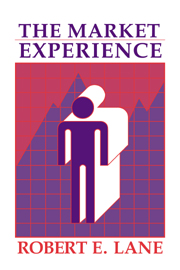Book contents
- Frontmatter
- Contents
- Acknowledgments
- Part I Introduction
- Part II Cognition and emotion
- Part III Self-attribution and self-esteem
- Part IV Human relations
- Part V Work
- Part VI Rewards
- 17 Maximizing pay: costs and consequences
- 18 Hidden costs of rewards and intrinsic satisfaction
- 19 The limits of hidden costs in the market
- 20 Intrinsic values: a balance sheet
- 21 The economics of the intrinsic
- Part VII Utility and happiness
- Part VIII Conclusion
- Author index
- Subject index
17 - Maximizing pay: costs and consequences
Published online by Cambridge University Press: 18 December 2009
- Frontmatter
- Contents
- Acknowledgments
- Part I Introduction
- Part II Cognition and emotion
- Part III Self-attribution and self-esteem
- Part IV Human relations
- Part V Work
- Part VI Rewards
- 17 Maximizing pay: costs and consequences
- 18 Hidden costs of rewards and intrinsic satisfaction
- 19 The limits of hidden costs in the market
- 20 Intrinsic values: a balance sheet
- 21 The economics of the intrinsic
- Part VII Utility and happiness
- Part VIII Conclusion
- Author index
- Subject index
Summary
It is surely not to be assumed without investigation or inquiry that production is a means only. … We are impelled to … to give thoughtful consideration to the possibilities of participation in economic activity as a sphere of self-expression and creative achievement.
Frank Knight, The Ethics of CompetitionIn the labor force of the mid-1980s almost everyone, except the roughly one-ninth who were either self-employed or in the agricultural sector, was an industrial or commercial employee working or seeking to work for pay. Here we examine the hypothesis that working people seek to maximize their pay. It is well known that, having other values and other considerations in mind, people who work rarely do adopt such a maximizing strategy, but it will be useful to explore the implications and limits of the pay maximization hypothesis, a hypothesis common among critics and defenders of the market alike. The hypothesis is not merely an economist's device employed for analytical purposes, for it is also a managerial belief actively guiding the government of firms. As part of the partially unconscious market ideology, the pay maximization hypothesis also affects a variety of behaviors and attitudes of which market participations are often unaware.
The main reason why the pay maximization hypothesis fails is that it does not take into account the relation between an external incentive such as pay and internal rewards based on the desire for personal control and self-esteem, desires whose objects are not always served by increased pay. The desire for pay is a proxy for these other motives.
- Type
- Chapter
- Information
- The Market Experience , pp. 339 - 363Publisher: Cambridge University PressPrint publication year: 1991

